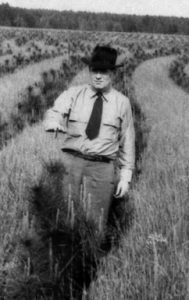“People can accomplish great things when they work together. Trees for Tomorrow captured the imagination of the people. We were a catalyst.” – Mully Taylor
He researched it, promoted it and launched it as a reforestation experiment. Then he had the vision to help it evolve as an education center. Sixty years later, one can hardly mention Trees for Tomorrow without mentioning Melvin “Mully” Taylor.
Born in Merrill, the son of a river log driver, Taylor had a stint as a newsman in Chicago and later took a job with the Merrill Herald as advertising manager 1943. The nation was at war, and pulpwood for the Wisconsin Valley paper mills was in short supply. A local committee of paper mill representatives and newspaper publishers asked Taylor to organize a North Central Wisconsin Pulpwood Roundup. Part of a national war effort, it linked cutting trees to patriotism and profit. Organizers wondered if they could have similar success persuading landowners to plant trees rather than cut them. Planting would provide future income for landowners and raw material for mills. Again, they turned to Taylor to research an industry-supported effort.
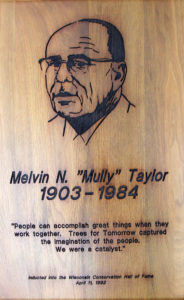 Trees for Tomorrow was launched in 1944 as a nonprofit organization to promote reforestation with financial support from nine paper mills in the Upper Wisconsin River Valley. Taylor served as its executive director for 31 years and was a behind-the-scenes catalyst for many conservation activities. Trees for Tomorrow initially worked with youth to plant trees for a Rhinelander school forest and a Boy Scout camp. By 1968, it had planted more than 15 million trees on private and public lands. The organization expanded to provided forest management plan preparation, planting, marking, timber sales setup and other contractual services to landowners in 39 counties in northern Wisconsin and upper Michigan.
Trees for Tomorrow was launched in 1944 as a nonprofit organization to promote reforestation with financial support from nine paper mills in the Upper Wisconsin River Valley. Taylor served as its executive director for 31 years and was a behind-the-scenes catalyst for many conservation activities. Trees for Tomorrow initially worked with youth to plant trees for a Rhinelander school forest and a Boy Scout camp. By 1968, it had planted more than 15 million trees on private and public lands. The organization expanded to provided forest management plan preparation, planting, marking, timber sales setup and other contractual services to landowners in 39 counties in northern Wisconsin and upper Michigan.
Meanwhile, a conservation education component was being developed in Eagle River, at the site of a former U.S. Forest Service training facility. A workshop for educators was so successful that Trees for Tomorrow began leasing the camp for a permanent environmental education center in 1946. Taylor established “a learning through doing” approach and espoused the long-lasting value of teaching integrated natural resource management.
Taylor was instrumental in encouraging people to work together for a common good. Over the years the camp has had many partners, including the Wisconsin Department of Natural Resources, U.S. Forest Service, University of Wisconsin System, state Department of Public Instruction, Soil Conservation Service, utilities, paper mills and other businesses.
Among his honors were a distinguished service award from the Forest History Association and the conservation education award from the Wisconsin Wildlife Federation.
Resources
Melvin “Mully” Taylor Biography
Melvin “Mully” Taylor Legislative Citation
Trees for Tomorrow 75th Anniversary Report
Mully and Billie Taylor: Stewards of the Trees, article by Marge Miley, 1989
Mully, Billie Taylor Die article
Mully Taylor inducted into the Wisconsin Forestry Hall of Fame, 1985
State of Wisconsin Mully Taylor Day, 1984
Mully Taylor’s history with Trees for Tomorrow
Photos
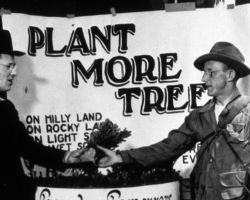
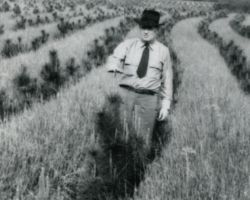
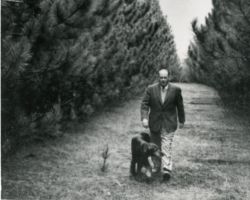
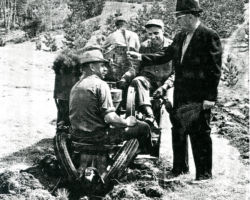
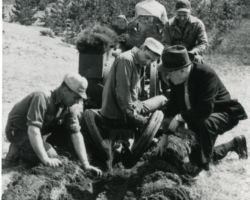
These images may be used under the Creative Commons Attribution-NonCommercial-NoDerivatives 4.0 International License.

